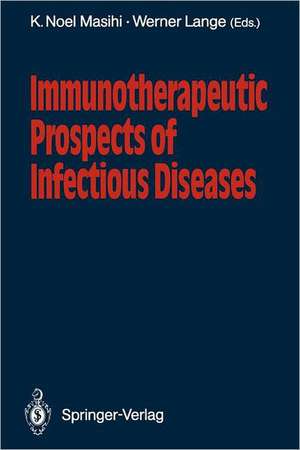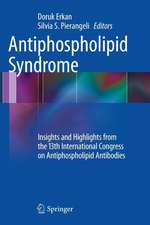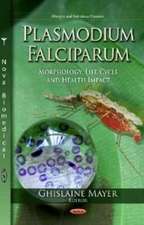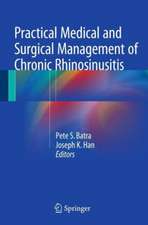Immunotherapeutic Prospects of Infectious Diseases
Editat de K. Noel Masihi, Werner Langeen Limba Engleză Paperback – 13 dec 2011
Preț: 722.69 lei
Preț vechi: 760.73 lei
-5% Nou
Puncte Express: 1084
Preț estimativ în valută:
138.29€ • 150.68$ • 116.53£
138.29€ • 150.68$ • 116.53£
Carte tipărită la comandă
Livrare economică 23 aprilie-07 mai
Preluare comenzi: 021 569.72.76
Specificații
ISBN-13: 9783642761225
ISBN-10: 3642761224
Pagini: 424
Ilustrații: XVIII, 401 p.
Dimensiuni: 155 x 235 x 22 mm
Greutate: 0.59 kg
Ediția:Softcover reprint of the original 1st ed. 1990
Editura: Springer Berlin, Heidelberg
Colecția Springer
Locul publicării:Berlin, Heidelberg, Germany
ISBN-10: 3642761224
Pagini: 424
Ilustrații: XVIII, 401 p.
Dimensiuni: 155 x 235 x 22 mm
Greutate: 0.59 kg
Ediția:Softcover reprint of the original 1st ed. 1990
Editura: Springer Berlin, Heidelberg
Colecția Springer
Locul publicării:Berlin, Heidelberg, Germany
Public țintă
ResearchDescriere
The prevention and control of infectious diseases represents, even today, an important public health problem for responsible national and international authorities. Newly emerging p.athogens such as human immunodeficiency virus (HIV) , legionella, and bovine spongiform encephalopathy (BSE) have captured current public awareness. Despite significant success against smallpox, polio myelitis, mumps, and measles, the vast majority of infectious diseases are yet to be satisfactorily controlled. Limited efficacy of some vaccines, e. g., against influenza viruses, or their nonavailability have hampered an effective control of many infections. A meaningful reduction of the health risks posed by microbial pathogens is of crucial importance. Increased efforts need to be exerted in areas of active and passive immunization as well as in stimulation of enhanced nonspecific resistance .. Progress in the field of infectious diseases can be accelerated when a generation of new improved vaccines are developed. These vaccines should be capable of activat ing the cellular and the humoral immune responses as well as inducing persistent immunological memory. Development of novel regimens for enhancing natural resistance against infections is also progressively gaining in importance. The urgency increases as chemotherapy against viral and other infections further continues to be plagued by a carousel of a limited number of licensed drugs, problems of side effects, and development of drug resistance. It is becoming expedient that future strategies embrace a policy directed towards triggering mechanisms capable of inducing specific and nonspecific host defences.
Cuprins
Immunomodulators in Infectious Diseases.- Immunopharmacology of a Class of Synthetics with Therapeutic Potential in Infections and Other Types of Diseases.- Lentinan and its Related Polysaccharides as Host Defence Potentiators: Their Application to Infectious Diseases and Cancer.- Purification and Endotoxin-Like Bioactivities of a Novel Amphiphile from Mycobacterium bovis BCG.- Bacterial Surface Components as Immunomodulators.- Effect of Free and Liposome-Encapsulated MTP-PE on Klebsiella pneumoniae Infection in Mice.- Immunomodulatory Capacity of Drugs Evaluated in a Mouse Model of Klebsiella pneumoniae Infection.- Modulation of Host Resistance by Polymeric Substances from Baptisia tinctoria and Echinacea purpurea.- Antivirals in Treatment of Experimental Bacterial and Fungal Infections.- Influence of Nonspecific Immunomodulation with Thymic Preparations on the Result of Infection in Some Experimental Parasitoses.- In Vitro Influence of Bovine and Human Diacetyl-Splenopentin on Human Peripheral Blood Lymphocytes in Comparison to Thymopentin.- Some Novel Pharmacological Properties of Lentinan.- AIDS.- Status and Current Prospects for the Immunotherapy of Human Immunodeficiency Virus (HIV) Infection.- Biological Activities of Polysaccharides and Those Derivatives Against Cancer and AIDS.- Experience with IMREG-1, a Leukocyte Derived Immunomodulator on Candidiasis and Progression of Disease in Patients with AIDS-Related Complex.- Reduced Replication of Human Immunodeficiency Virus in Promonocytic Cells by Bacterial Immunomodulators and Anti-Retroviral Drugs at an Early Stage of HIV-Infection.- Abrogation of Azidothymidine-Induced Bone Marrow Toxicity by Free and Liposomal Muramyl Dipeptide.- Effectiveness of Diethyldithiocarbamate (DTC, Imuthiol) in Reducing the Incidence of Opportunistic Infections in Patients with AIDS and ARC. A Randomized Placebo Controlled Multicenter Study.- Effects of Synthetic HIV Peptides, Cytokines and Monophosphoryl Lipid A on Chemiluminescence Response.- Host Defence and Immunmodulation.- A Mutual Role of the CNS and Immune System in Host Defence.- The Role of Complement in Host Defence and Immune Response.- Infections, Cancer and Natural Killer Cells.- Polysaccharide Lentinan-Treatment Combined with Inflammatory Agent Augments Antitumor Activity of LAK Cells.- Infiltration of Host Cells in Local Tumor Sites Triggered by the Administration of Anti-Tumor Polysaccharide, Lentinan.- B669 — A Novel Riminophenazine with Potent Phagocyte Activating Properties.- Modulation of Macrophages from Different Anatomical Sites by GF787. Role in Murine Infection with Salmonella typhimurium.- Enhancement of Phagocytic Activity by Desmuramyl Peptide AdDP in Guinea Pig with a Cyclophosphamide-Induced Immunosuppression.- Ex Vivo and in Vitro Effects of Adamantylamide Dipeptide (AdDP) on Macrophages and Lymphocytes.- Effects of Adamantylamide Dipeptide (AdDP) on Cell Mediated Immunity in Vivo.- The Influence of Selected Antimicrobial and Antineoplastic Drugs on Chemiluminescence of Peripheral Granulocytes.- Orally Administered Lectin Stimulates Defence Mechanisms in Humans.- A Study on the Serum Concentration of Lentinan Administered via Various Routes in Tumor Bearing Mice and in Human Breast Cancer Patients: In Relation to Antitumor Effect.- The Role of Oxygen Activated Species in Endotoxin Induced Modulation of Antioxidant Enzymes Activity.- Cytokines.- Protective Activity of MDP-Lys(L 18) and Recombinant Cytokines Against Sendai Virus and Herpes Simplex Virus (HSV) Infections in Mice.- Activation of Phagocytes by Recombinant Interferon-?.- Poly A-Poly U: An Updated Review.- Interaction of Rat Macrophages with Leishmania infantum: Role of Tumor Necrosis Factor.- Pretreatment of Mice with GF787, a Fraction of Propionibacterium acnes,Enhances Macrophage Resistance to Leishmania infantum.- Recombinant Interferon in Treatment of Infectious Diseases of Central Nervous System in Newborns.- Polysaccharide-Protein Complexes as BRMs in Septic Shock.- Decrease of the Proportion of HLA-DR+ Monocytes as Prognostic Parameter for the Clinical Outcome of Septic Disease.- Vaccines, Adjuvants and Antibodies.- The Challenge of Chronic and Persisting Infections for Vaccine Development.- Needs for New Vaccines and Improved Immunization Schedules.- ISCOMS: Application in Infectious Diseases.- Role of Adjuvants in Malaria Vaccines.- Cytokines — The New Generation of Adjuvants for Vaccines?.- Effect of Adamantylamide Dipeptide on Antibody Response to Influenza Subunit Vaccines and Protection Against Aerosol Influenza Infection.- Immunomodulatory Effects of Influenza Subunit Vaccine Adjuvantized with Adamantylamide Dipeptide (AdDP) or its Constituent Components.- Some Immunopharmacological Properties of Adamantylamide Dipeptide (AdDP).- Idiotypic Vaccines: Role of Network Antigen.- The Role of Human Monoclonal Antibody Specificity and Avidity in the Protection Against Gram-negative Bacteria.- Anti-Bacterial Reactivity of Human Monoclonal Polyspecific Natural IgM Antibodies — a Basic Defence. Mechanism Against Infectious Agents.- Suppression of Virus Reproduction by Hydrophobized Antibodies Against Viral Proteins.- Respecrin — a New Approach to Constructing Drugs with Targeted Action.- New Approaches to Vaccination against Icterohaemorrhagiae Leptospirosis.











